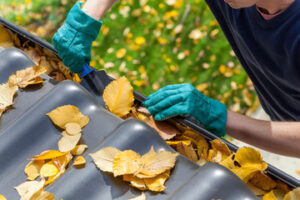A gutter system helps to keep your home clean and prevents soil erosion, basement flooding, or foundation issues. However, gutters must be regularly cleaned to be effective.
Gutters hang from your roof and channel rainwater into vertical sections called downspouts. Downspouts drain water away from your house to prevent damage to your siding, fascia boards, and paint.
Gutters, rain gutters, downspouts, and other parts of the gutter system protect your home from a number of different problems, including water damage, mold growth, and pest infestation. These are all issues that can become expensive and dangerous for your home if not addressed.
Gutter systems channel the rainwater that falls on your roof into a single flow and away from the foundation of the house. This protects the basement from flooding, reduces erosion on and around your property, prevents flower beds from becoming swamps, and keeps the soil around the foundation of the house dry. This also helps to keep your foundation from shifting over time, which can cause cracks in the walls and chimneys.
When you are looking to replace your gutters, it is important to choose a company that you trust. You will want to make sure that they will be honest about the cost and timeline of the project and will communicate clearly if any complications arise. The right company will make you feel comfortable throughout the process and give you peace of mind that your new gutter system is going to protect your home for years to come.
Keeping your gutters clean is also important to prevent clogs. When a gutter becomes clogged with leaves, shingle grit, pine needles, and other debris, it prevents the water from flowing through the gutters and down the downspouts to the ground. Without a functioning gutter system, this moisture will pool up in the soffit and fascia of your roof and around the foundation of your house, causing damage to these areas.
Another problem that occurs when there is too much moisture around the foundation of your home is mold and mildew. Any area that stays damp for long periods of time is susceptible to the growth of these contaminants. If the mold is not removed from these areas, it can start to rot the wood, paint, and stain of your home and lead to leaks in the basement and walls of your home. Gutters, and especially the downspouts, are essential for preventing this from happening to your home.
Prevents soil erosion.
The main purpose of gutters is to direct rainwater away from the foundation. This is important for both home safety and the health of a garden. If there are no gutters, the rainwater will simply roll off the roof and wash down into the yard, which can cause soil erosion and muddy landscaping. However, if the rainwater is properly channeled into a gutter and downspout system, it can be guided away from the house or directed into a water tank, hose, or other type of water storage solution for use when there is scarcity.
Clogged gutters overflow and spill over the sides, which is a common problem in areas that receive heavy rainfall. This can damage the landscaping around a house, or worse, it can lead to basement flooding.
The downspouts and leaders on a well-installed gutter system are designed to divert water from the house. This will eliminate soil erosion, which can be an issue if the landscape isn’t carefully planned. Erosion can carve out unsightly gullies, destroy flowerbeds, and expose the foundation of a house. In addition, erosion can cause the soil to heave under a house’s foundation, which can result in costly structural damage.
Gutters are also important for preventing soil erosion on a property with little or no roof overhang. Without gutters, rainwater will simply fall off the roof, cascading down the side of the house and forming trenches in the yard. This can damage plants and erode the soil, leaving nothing to support the plant’s root structure. Gutters are a critical part of any landscaping plan, especially for homes with minimal or no roof overhang.
Keeping your gutters clean is one of the most important things you can do to protect your home. Regular cleaning will help prevent the accumulation of leaves, twigs, and other debris that can create a blockage. If you are unable to clean your gutters by yourself, consider hiring a professional. Using a ladder that is tall enough to allow you to reach the gutters is essential to cleaning them. In addition to removing debris, it is a good idea to inspect your gutters for cracks or holes and for signs of rust.
Prevents water damage.
Gutters direct water away from your home so that it doesn’t sit on the ground or foundation. If it does, your home’s structure could be compromised, leading to costly repairs and renovations. This is why it’s so important to ensure your gutter system is properly working and cleaned on a regular basis.
Without a gutter, water that falls from the roof will rest against the house instead of being directed away. This will cause the soil to erode and may lead to cracks in the foundation of your home.
If the water doesn’t drain properly, it can overflow, back up onto the roof, and cause other damage. This will also create a moisture problem that can encourage the growth of mold and mildew. This can make your family sick, and it is an expensive repair.
Gutters that are clogged will cause the water to overflow and splash down the sides of your house. This can damage the paint and siding, creating ugly stains. Clogged gutters can also attract pests like mice, birds, mosquitoes, and bugs that can enter your home and cause damage.
Ensure your gutter system is correctly pitched. It should have about a quarter of an inch of pitch or slant for every 10 feet of gutter. Any more than this, and there’s a chance the water will slouch over the end of the gutter that connects to the downspout or leader, flooding that section. Any less, and the gutter won’t drain properly either.
Leaking gutters can expose sections of the wooden beams that support the roof to high levels of moisture, which can cause them to rot. This will require replacement parts and possibly a full roof replacement.
Gutters that aren’t clogged will allow water to flow down and out of the gutters, where it should. This prevents the overflow of water that causes rust and other damage to your home’s structure. It’s important to inspect your gutter system regularly to see if there are any dents, rust spots, or loose joints. These can be easily fixed by a professional before they become worse.
Prevents Pests.
Gutters can help prevent pests from entering your home. A clogged gutter can be a breeding ground for many types of pests, including cockroaches, rodents, squirrels, birds, and other insects. In addition to providing a food source and shelter, these pests can also cause damage to your home. For example, cockroaches can chew through the fascia and roof boards to enter your home. They can also spread germs and bacteria throughout your house. Moreover, the noise and scratching of these pests can be disruptive.
Gutter systems collect leaves, twigs, branches, acorns, pine needles, and other debris. While this may sound like regular outdoor debris to you, it is the perfect meal for pests and critters. They use this material to build their nests and homes, as well as as a food source. In addition, a clogged gutter provides a safe haven for pests because they are away from the elements and predators.
During rainstorms, a clogged gutter can overflow with debris and cause water to spill over the sides of your home and onto the foundation. Over time, this can lead to erosion, cracks in the foundation and walls, and even leaks in the basement or crawl space. Gutters that are clogged with debris can also be a breeding ground for mosquitoes, which require standing water to lay their eggs.
In addition, a clogged gutter can attract rodents like mice and rats. These animals love to make their homes in the twigs, sticks, and leaves that pile up in a clogged gutter. Moreover, a clogged gutter can be a great place for squirrels to create their nests since it is high off the ground and away from predators.
A clogged gutter can also be a breeding ground for termites and carpenter ants. These pests can destroy the wood in your gutters and attic, leading to costly repairs. In addition, these pests can also infest the interior of your home by chewing through wires and insulation. Lastly, a clogged gutter can encourage squirrels to access your attic through the roof and into the rest of your home.
